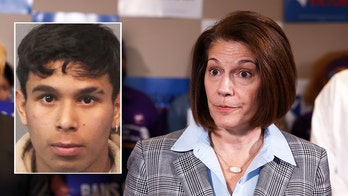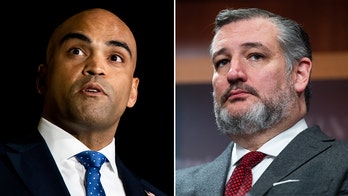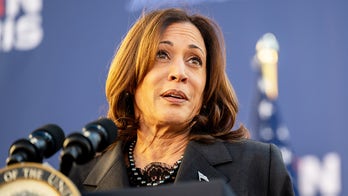President-elect Barack Obama labeled the tax problems of his choice for Treasury chief an embarrassment Wednesday, but said Timothy Geithner's "innocent mistake" shouldn't bar him from the post leading urgent efforts to revive the economy. Despite the controversy, Geithner's confirmation seemed all but sure -- though not by Inauguration Day.
Revelations that Geithner had failed to pay $34,000 in taxes several years ago derailed Senate Democrats' plans to speed him to approval as treasury secretary by the time Obama is sworn in.
Bipartisan backing was still strong, but the delay in his confirmation hearing opened the possibility that opposition could build.
Stuart Levey, the Treasury Department's undersecretary for terrorism and financial intelligence, has agreed to stay on until the Senate confirms a permanent successor, according to a government official with knowledge of the situation but unauthorized to speak publicly.
Senate Republicans, who have been mostly deferential to Obama's nominees, were blocking efforts to fast-track Geithner's nomination, with at least one Finance Committee member saying the tax questions deserved greater scrutiny.
Obama had hoped for approval by Tuesday, but given the GOP objections, senators scheduled Geithner's confirmation hearing for next Wednesday, with Senate debate and a vote sometime after that.
Two Republicans formally objected to scheduling the hearing this Friday after the panel disclosed that Geithner had failed to pay some taxes he owed between 2001 and 2004.
"Look, is this an embarrassment for him? Yes. He said so himself. But it was an innocent mistake," Obama said. "My expectation is that Tim Geithner will be confirmed."
Obama spoke at his transition office after a meeting with Vice President-elect Joe Biden and Sen. Lindsey Graham, R-S.C., about a recent trip to Afghanistan, Pakistan, Iraq and Kuwait.
A number of Democrats and Republicans on the Finance Committee voiced strong support for Geithner, who was phoning senators individually in an effort to persuade them his tax problems were the result of innocent errors, not deliberate attempts to avoid paying the Internal Revenue Service.
Senators' reactions suggested they viewed his missteps more as embarrassing mistakes than as disqualifying misdeeds. That's despite the fact that tax problems have helped sink other government nominees, including Zoe Baird, Bill Clinton's choice for attorney general, who stepped aside when word leaked that she had hired illegal immigrants as household workers and failed to pay their Social Security taxes.
"It's an honest mistake," said Sen. Max Baucus, the Montana Democrat who chairs the committee, adding that confirmation was "a given" for the man who would move to Washington from his position as president of the New York Federal Reserve.
Geithner is "very, very competent, and add to that the country needs to have an economic team in place immediately to address the dire economic problems," he said.
Sen. Jon S. Kyl of Arizona, the committee's No. 2 Republican, blocked the hearing by insisting on rules that require a full week's notice for scheduling, according to an aide close to the confirmation process. A second committee Republican, Jim Bunning of Kentucky, was also balking.
"Senator Bunning did not feel it was appropriate to rush forward with the hearing this week in light of the late-breaking information," said his spokesman, Mike Reynard. "He wanted more time to carefully consider" the disclosures.
But other Republicans said their party had little appetite for a fight over Geithner at a precarious time for the economy.
"Now is not the time to think in small political terms," said Graham of South Carolina. "I don't see any desire by the Republican Party to play gotcha on this. ... I think he's the right guy."
Sen. Charles E. Grassley, the senior Finance Republican, said he was not inclined to oppose a quick hearing, although he also said the tax troubles were "disconcerting" given that Geithner was auditioning for a post where his considerable powers would include control of the Internal Revenue Service.
"I'm not saying at this point it's disqualifying," Grassley told reporters in a conference call. "But it's a little more important about income tax for somebody that's overseeing the IRS than there is, maybe, for the secretary of agriculture, as an example."
The revelations all but guarantee that Geithner's confirmation hearing will feature a thorough grilling about his tax errors.
He failed to pay self-employment taxes for money he earned from 2001 to 2004 while working for the International Monetary Fund, according to materials released by the committee Tuesday.
He paid some of the taxes in 2006, after an IRS audit discovered the discrepancy for the years 2003 and 2004. But it wasn't until much later -- days before Obama tapped him to head Treasury late last year -- that Geithner paid back most of the taxes, incurred in 2001 and 2002.
He did so after Obama's transition team found that Geithner had made the same tax mistake his first two years at the IMF as the one the IRS found he made during his last two years.
Still, GOP Sen. Orrin G. Hatch of Utah called the tax problems "a mistake that a human being can make" and cautioned fellow Republicans to "think this through" before digging in against Geithner. "They're not going to get anybody better than him from this administration for treasury secretary," he said.
And John Ensign, R-Nev., who said he spoke with Geithner for about a half-hour on Wednesday, said he didn't foresee trouble for the nominee. "It's very, very easy to make honest mistakes," he said.
Pat Roberts, R-Kan., said he probably would vote to confirm Geithner.
Obama's team informed Baucus and Grassley of the problems in early December, and a subsequent investigation by their staffs unearthed another embarrassing detail about Geithner: that a housekeeper he employed in 2005 allowed her legal immigrant work status to lapse for three and a half months.
It was the unpaid taxes, though, that were proving more of a problem. Obama's team says his mistake was a common one for people hired by international organizations and foreign embassies that don't pay the employer share of Social Security taxes. The IRS estimated in 2006 that as many as half those employees had made tax-filing mistakes, and offered a group settlement to let them correct the errors.
But the Finance Committee, in 30 pages of documents released on Tuesday, noted that the IMF issues several clear guidelines each year for its employees detailing their responsibility to pay all their self-employment taxes, and that Geithner had signed annual statements saying that he would do so. He also had experience dealing with such taxes, the panel noted.




